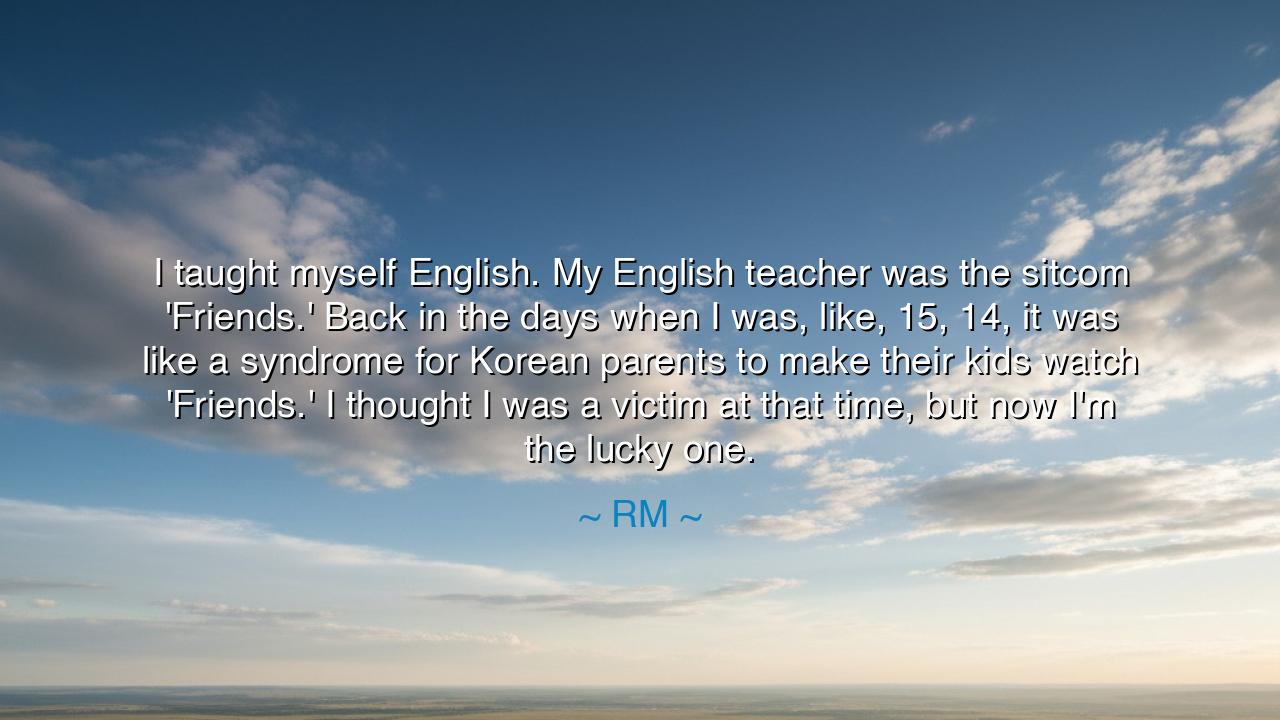
I taught myself English. My English teacher was the sitcom
I taught myself English. My English teacher was the sitcom 'Friends.' Back in the days when I was, like, 15, 14, it was like a syndrome for Korean parents to make their kids watch 'Friends.' I thought I was a victim at that time, but now I'm the lucky one.






The words of RM—“I taught myself English. My English teacher was the sitcom 'Friends.' Back in the days when I was, like, 15, 14, it was like a syndrome for Korean parents to make their kids watch 'Friends.' I thought I was a victim at that time, but now I'm the lucky one”—speak to the paradox of discipline and destiny. What once felt like a burden, an imposition from without, was in truth the planting of a seed that would later blossom into strength and opportunity. It is a reminder that in the struggles of youth, when we resist guidance and lament hardship, there often lies hidden the foundation of future greatness.
The origin of this reflection lies in the universal experience of learning through unorthodox means. RM, before becoming the voice of millions as a leader of BTS, did not learn English in grand schools or under renowned tutors, but through the rhythms of a sitcom, the laughter of characters, and the persistence of repetition. What seemed ordinary—television—became extraordinary when embraced as a tool. This is the way of wisdom: to transform what is common into what is profound, to turn the mundane into a teacher.
History provides many such examples. Consider Abraham Lincoln, who was largely self-taught, reading borrowed books by firelight in a log cabin. He too might have seen his circumstances as unfortunate, even cruel—a boy of poverty with little schooling. Yet the very discipline he forged in solitude made him a master of words and wisdom, able to guide a fractured nation. Like RM, he found that what once felt like deprivation became the foundation of strength. Both remind us that true learning often arises not from luxury, but from determination.
The emotional force of RM’s words lies in his confession: he once believed himself a victim. The weight of parental expectation, the monotony of watching and rewatching a foreign show, seemed a burden. Yet time revealed it as a gift, one that set him apart. How often in our own lives do we curse present discomforts, blind to the blessings they conceal? Only later, looking back, do we see that the things we resisted most fiercely were the very things that prepared us for our calling.
There is also a heroic lesson here about the unexpected teacher. RM did not sit in a classroom with strict grammar charts and dry exercises; his teachers were Ross, Rachel, Chandler, and Monica. He shows us that wisdom may come from unlikely places, if the heart is open. A sitcom became a mentor, television became a classroom, and laughter became the doorway to fluency. The wise do not scorn small beginnings; they recognize that every moment, every medium, can become a lesson if embraced with diligence.
The lesson for us is clear: do not despise discipline, even when it feels forced upon you. What feels like a burden today may be the blessing that empowers you tomorrow. Do not dismiss the ordinary tools of life, for even a book, a song, or a television show can become a mentor if used with intention. And above all, remember that the struggles of youth are not punishments, but preparations.
What, then, shall we do? Let us face our current labors with patience, trusting that time will reveal their worth. Let us turn the everyday into instruments of learning, training our minds with creativity and persistence. Let us be grateful to those who push us, even when we resist them, for often they see the seeds of greatness in us before we can see them ourselves. And let us remind the next generation that the path to wisdom may come from unexpected teachers, even from the glowing screen of a sitcom.
Thus, RM’s words, though lighthearted, become a timeless teaching: that the burdens of youth may be blessings in disguise, and that learning, when pursued with courage and patience, can transform even the humblest of tools into a path of greatness. What once seemed like victimhood becomes the mark of the lucky one—for the true treasure lies not in the ease of learning, but in the perseverance that unlocks destiny.






AAdministratorAdministrator
Welcome, honored guests. Please leave a comment, we will respond soon